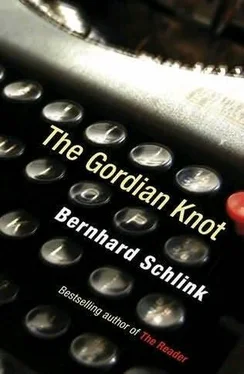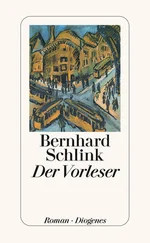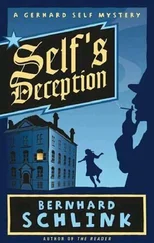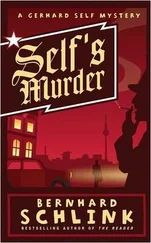He rented a car, got a map of the city, and drove off. At first he drove aimlessly, wherever the flow of traffic or the signs and one-way streets took him. He drove through long streets with two- and three-story apartment buildings. They were of brightly painted wood and adorned with bay windows, gables, and little towers. Business and neon signs suddenly jutted out between the first and second stories, advertising delis, Pepsi-Cola, antiques, dry cleaning, auto-repair shops, breakfast, self-service laundries, real estate, restaurants, picture framing, Budweiser, shoes, fashions, Coca-Cola, and more delis. The businesses and signs disappeared just as suddenly, followed by one apartment block after another. Georg drove through residential streets, shorter than those in Manhattan, the architecture more daring, the streets cleaner and emptier, and the small bits of nature greener. He drove over the hills of the city as excited as if he were on a roller-coaster ride. The topography didn’t match the grid imposed on it, so they pointed up at the sky or down onto other streets. One moment he would be looking down at water, container ships, sailboats, and bridges, and another moment at the silhouettes of skyscrapers merging together at one end of the city, and the many arms with which freeways reached out over and between the buildings, over and under each other. He had the window open and the radio on, and let music and wind whistle about his ears. Sometimes he stopped, and stepped out like a tourist wanting to take a picture. But he only looked to see whether a small place was open enough, or a street lonely enough, or whether a staircase leading down from a steep, hilly street led only to a building or to the next street below.
On Sunday Georg forbade himself to look at the city map. He tried to get a feel for the city and its streets without it. He would have noted a suitable place on the map, but didn’t find any. Still, by evening he had an idea of the peninsula, the ocean to the west, the bay to the east, the Golden Gate Bridge to the north. And he had an idea of how the city had originally grown up in the north, on the bay, and later proliferated over the rest of the peninsula.
On Monday morning, with the city map, he proceeded systematically. He drove through the parks and then along the coast of the Pacific. He found isolated places in Golden Gate Park, but their isolation could only shield them from surprise by a hiker, not a purposeful pursuer. The ocean beach stretched out long and open; gray clouds under a gray sky, gulls beating in the wind, a few joggers, a few hikers, a surfer who never got beyond the first wave, a yellow dredger piling up or carting off sand. But in front of the wall separating the road and the beach there were too many cars parked with people sitting in them. He went to an isolated hot-dog stand, and when the man fished the hot frankfurter from the pot of water the steam rose up in a dense cloud. It was cold here; in the morning Georg had started out from the building on the bay under a blue sky, and in the center of the peninsula had driven into the fog covering the Pacific Coast.
Then he thought he had found the place he was looking for. At the north end of the beach the land was hilly and the coast fell steeply to the sea, bending inward toward the Golden Gate Bridge and the bay. A street went up to the top of a hill, and Georg stopped in surprise in front of an acropolis. A square of low buildings and a classical arcade, and in the square in front a large circle with an empty fountain basin in the middle, and broad steps leading to the columned portico. He parked his car and walked around the circle. The sun had dissolved the clouds, and through the trees he looked down on the city, the ocean, and the twin red masts and arching roadway of the Golden Gate Bridge. Below him, two helicopters were flying along the shore. From the golf course, which came as far as the acropolis, one sometimes heard the strokes and voices of nearby players, or the soft hum of a golf cart. He could hear occasional cars in the distance coming closer and fading away again. Otherwise it was completely quiet. An enchanted place.
When he went up the steps to the portico he saw that this acropolis was an art museum, and that it was closed on Mondays and Tuesdays. He could imagine the cars that would be parked here side by side on Wednesday. And to destroy the enchanted mood, three cars drove up and disgorged a noisy Chinese or Japanese wedding party. He went back to his car. The bride was pretty.
On Monday evening he had grown tired of the city, but more tired of himself and his purposeful, meandering tourism. He liked the city’s clarity that one could almost touch, its fresh cool breeze despite the relentless sunshine, the variety of its districts, cultures, and enticements. He thought one might portray San Francisco as a seductive virgin in starched frills, a virgin simultaneously flaunting and withholding her charms, while New York was an old hag, heavy and squat, sweating, steamy, stinking, babbling incessantly, sometimes screaming. But he was also sick of his perceptions and his useless sensibility. He hadn’t found the place he was looking for. He parked the car and went to Jonathan and Fern’s place. Jill was still awake; he gave her her bottle and changed her diaper on the long table in the kitchen, where he could roll her right and left. He tried to teach her to crawl. She crowed with pleasure. Then he put her down in the wide bed he shared with her. He was anxious lest she fall out, or that he would roll over on her. She followed him into his dreams.
Jonathan and Fern were cooking, and invited Georg to dinner. Cordial and interested, they asked what his business was. He suffered from his evasive answers, again longing to be normal and open. The couple was happy, although Fern was between jobs and Jonathan had had to interrupt his painting to earn some money. Then all three of them drank too much, and Jonathan became loud and boisterous, took his pistol out of a desk drawer, and shot out the streetlight across the street. Fern laughed and played along, but knew how to let Jonathan know when it was time to go to bed. Georg, too, longed for a relationship that would make him feel as whole and accepted as Fern’s. What the hell, he thought, I long for Fran, whether or not she accepts me or pushes me away. I long to have the life with her that we only lived the shadow of in Cucuron and New York. And if living with Fran is like Fran herself, and there’s nothing left to discover behind what I see and know, nothing more to awaken with a kiss, then I want and like what I see and know.
Everything else could go to hell, he thought: Joe, Mermoz, and Gorgefield, his revenge, the big money. He knew that the next day he would go on looking for the meeting place, drive to Gorgefield, and speak with Buchanan. He realized that the two things didn’t go together or belong together, just like the clarity and intoxication in his head.
THE NEXT MORNING GEORG found himself alone in bed. Fern had left him a note that she was letting him sleep in and had taken Jill to go walking with the dog. In his pajamas he strolled through the apartment with a cup of coffee, looking at Jonathan’s paintings.
They were big oil paintings, six by nine feet and larger, in dark, matte colors out of which shone through, here and there, the glowing blue or red of the pattern of a carpet. They showed a nude at the desk, a nude on the sofa, a nude sitting on the floor with her back leaning against the wall, an empty room in which the torso of a man sleeping on the floor stood out against the wall. All the paintings radiated coldness, as if the air in those rooms were thin and the people frozen in their attitudes. Georg took a gulp of hot coffee. Or had Jonathan painted the pictures with painfully restrained passion, the paintings turning lifeless in the process? The next painting was of the back of a television set and a couple: she was sitting on the sofa looking at the screen, while he was standing behind the sofa and turning to leave. Or does Jonathan want to prove that communication is impossible and loneliness unavoidable? Then there were paintings of nature, a glacier landscape in front of which two men were locked in combat; a meadow with a couple sitting, more next to each other than with each other; a forest clearing in which a man is kneeling, holding and kissing a little girl. Now Georg saw the paintings from a different angle. Jonathan didn’t want to prove that loneliness was unavoidable, but everything went to show that it was, whether he wanted it to or not, presumably even against his will and against his attempts to capture and represent closeness. The closed eyes of the man kissing the little girl didn’t express self-abandon but tension; the girl seemed to want to run away.
Читать дальше












